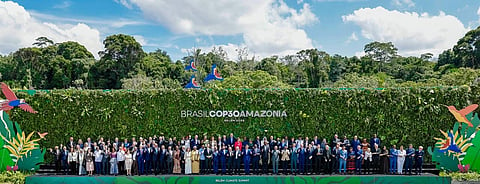

The COP30 Leaders’ Summit in Belém — gateway to the Amazon — was dominated by searing criticism of the world’s failure to align financial systems with climate goals. World leaders demanded a clear roadmap to end global dependence on fossil fuels and deliver long-promised climate finance.
Ahead of the formal negotiations beginning November 10, leaders confronted sobering evidence of inaction on funding the energy transition. Brazilian President Luiz Inácio Lula da Silva issued a sharp ultimatum on fossil fuels and financial accountability, warning that “the decisions we make regarding the energy sector will determine our success or failure in the fight against climate change.”
“The planet can no longer sustain a development model based on the intensive use of fossil fuels that has prevailed for the past 200 years,” Lula declared, as the Energy Transition session underscored the widening gap between climate ambition and global capital flows.
Energy use accounts for 75 per cent of global greenhouse gas emissions, and while renewable generation has tripled in the past decade, Lula noted that the transition is stalling under financial pressure. “Despite progress, 2024 saw record-high carbon emissions from the energy sector — the highest since 1957,” he said. Since the Paris Agreement, the share of fossil fuels in the global energy mix has barely shifted, from 83 per cent to 80 per cent.
Lula blamed the imbalance squarely on perverse financial incentives: “Financial incentives often go in the opposite direction of sustainability.” He revealed that the 65 largest banks collectively financed $869 billion for oil and gas projects last year alone.
The imbalance is stark. Reports show that since the Paris Agreement, Global North governments have provided only $280 billion in grant-based climate finance, while oil and gas firms in their economies earned $1.3 trillion in profits. UN Secretary-General António Guterres condemned this as a “moral failure and deadly negligence.”
Lula warned that “spending twice as much on weapons as on climate action is paving the road to climate apocalypse.” Developing nations — including India — have demanded that wealthy countries “pay up starting now” to meet the $310-365 billion a year required by 2035 for adaptation alone.
Lula urged a “clear roadmap to end dependence on fossil fuels,” outlining commitments for a “just, orderly, and equitable” transition that ensures access to technologies and finance for the Global South.
Key proposals included:
1. Implementing the Dubai Agreement to triple renewable capacity and double energy efficiency by 2030.
2. Addressing energy poverty by including clean cooking and electricity access for the two billion people still lacking it.
3. Adhering to the Belém Commitment to quadruple sustainable fuel use by 2035.
To finance this shift, Lula proposed innovative tools such as debt-for-climate swaps and allocating “part of the profits from oil exploitation toward the energy transition.” Brazil will create a fund based on this model.
Amid the heated debate on fossil fuel finance, a major initiative emerged: the launch of the Tropical Forests Forever Facility (TFFF) — described as “environmental technology made in Brazil.” The facility aims to become a key mechanism to keep forests standing while generating stable returns for investors.
Launched on November 6 with $5.5 billion in starting capital, the TFFF seeks to mobilise $25 billion in public funds and $125 billion in combined resources. India, the world’s third-largest renewable energy producer, joined as an observer. Unlike traditional grants, the TFFF is a guaranteed-return investment, ensuring contributors “will get their money back.”
The largest pledges came from Norway ($3 billion over a decade), Brazil and Indonesia ($1 billion each), and France ($500 million). Australian billionaire Andrew Forrest became the first private donor with a $10 million pledge. Germany promised a substantial contribution but withheld figures, while the UK opted out. More investments are expected over the coming year.
Crucially, 20 per cent of the funds will go directly to forest-dwelling Indigenous communities — hailed by Juan Carlos Jintiach, executive secretary of the Global Alliance of Territorial Communities, as a “historic victory recognizing our leadership in the fight against climate change.”
Meanwhile, Brazil and Azerbaijan jointly released the “Baku to Belém Roadmap,” outlining steps to mobilise at least $1.3 trillion in climate finance by 2035. Both presidencies stressed their role ends with proposing, not securing, the plan’s approval.
As the costs of inaction mount, adaptation, climate finance, and ambition gaps in national plans have taken centre stage. Over the next two weeks, negotiators and the COP30 Presidency will need to turn these pledges into progress — through formal negotiations on the Global Goal on Adaptation, Just Transition, and the Presidency’s Action Agenda.
President Lula concluded by challenging the assembled leaders to choose their legacy: “We, the leaders, must decide whether the 21st century will be remembered as the century of climate catastrophe — or as the moment of intelligent reconstruction.”